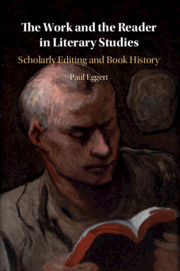Book contents
- The Work and the Reader in Literary Studies
- The Work and the Reader in Literary Studies
- Copyright page
- Dedication
- Contents
- Figures
- Preface
- Chapter 1 Introduction
- Chapter 2 Reviving the Work-Concept
- Chapter 3 The Digital Native Encounters the Printed Scholarly Edition Called Hamlet
- Chapter 4 The Reader-Oriented Scholarly Edition
- Chapter 5 Digital Editions
- Chapter 6 The Work, the Version and the Charles Harpur Critical Archive
- Chapter 7 Book History and Literary Study
- Chapter 8 Book History and Literary Study
- Chapter 9 Adaptation, Folklore and the Work
- Chapter 10 Conclusion
- Notes
- Bibliography
- Index
Chapter 1 - Introduction
The Book, the Work and the Scholarly Edition
Published online by Cambridge University Press: 19 August 2019
- The Work and the Reader in Literary Studies
- The Work and the Reader in Literary Studies
- Copyright page
- Dedication
- Contents
- Figures
- Preface
- Chapter 1 Introduction
- Chapter 2 Reviving the Work-Concept
- Chapter 3 The Digital Native Encounters the Printed Scholarly Edition Called Hamlet
- Chapter 4 The Reader-Oriented Scholarly Edition
- Chapter 5 Digital Editions
- Chapter 6 The Work, the Version and the Charles Harpur Critical Archive
- Chapter 7 Book History and Literary Study
- Chapter 8 Book History and Literary Study
- Chapter 9 Adaptation, Folklore and the Work
- Chapter 10 Conclusion
- Notes
- Bibliography
- Index
Summary
From the 1980s a pincer movement on editorial prerogatives came into play. The post-structuralist movement gradually undermined the assumption that works required a single reading text based on final authorial intention. Texts were also revealed to have a social dimension, as the meanings of their versional, redesigned and reprinted forms are ‘realised’ by successive readerships. The inherited but rarely inspected work-concept was thrown into doubt.
Conscientious editors who nevertheless felt the need to intervene on behalf of a new readership seemed to be left with no ground to stand on.
This chapter argues that a failure to theorise the work-concept is at the root of the problem. It shows that we need a broader concept of textual agency and an emphasis on the role of the reader in the functioning of what may now be cast as the embodied or living work. The role of the reader applies also for the scholarly edition, which emerges as a form of argument, aimed at the reader, about the archival materials it deploys.
Other possible work-models are considered, especially those implied in the writings of Franco Moretti and Rita Felski, based on the actor-network theory of Bruno Latour.
Keywords
- Type
- Chapter
- Information
- Work and the Reader in Literary StudiesScholarly Editing and Book History, pp. 1 - 18Publisher: Cambridge University PressPrint publication year: 2019



